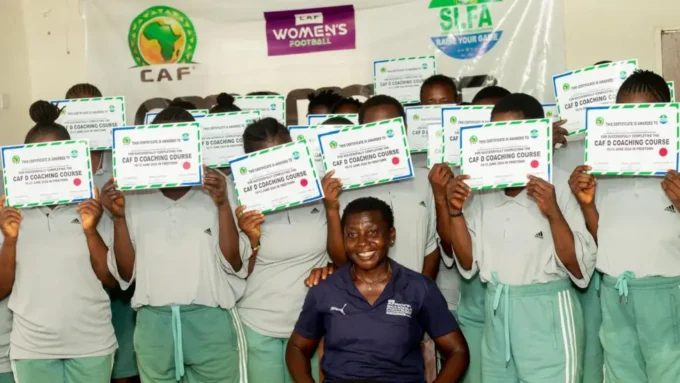Kenya’s athletics community has been rocked by the provisional suspension of long-distance running star Emmaculate Anyango Achol, who earlier this year set the second-fastest 10-kilometer time in history. The Athletics Integrity Unit (AIU) announced her suspension after she tested positive for testosterone and erythropoietin (EPO), two prohibited substances. Achol’s suspension, which takes effect immediately, marks another troubling chapter in the ongoing battle against doping in Kenyan athletics.
The AIU, in its official statement, confirmed that the 22-year-old athlete’s positive test triggered a provisional ban, with further investigations now underway. Achol had been celebrated as one of Kenya’s rising stars, especially after her remarkable performance in the 10 kilometers Valencia Ibercaja road race in Spain earlier this year. Achol finished the race in 28:57, the second-fastest time ever recorded for a woman over this distance, just 11 seconds behind her fellow Kenyan Agnes Ngetich, who set the world record at 28:46.
Achol’s rapid rise had positioned her as a new force in Kenyan athletics, a country renowned for its dominance in long-distance running. Her performance in Valencia cemented her status as a serious contender on the global stage. However, her suspension for doping now casts a shadow over her achievements and raises concerns about the integrity of the sport in Kenya.
This is not an isolated case for Kenya. In recent years, the country has been grappling with a growing number of doping violations involving some of its most celebrated athletes. High-profile figures such as former marathon world record holder Wilson Kipsang and 2016 Olympic marathon champion Jemima Sumgong have been banned for similar infractions, tarnishing the country’s reputation as a producer of world-class runners. These scandals have drawn increased scrutiny from global anti-doping agencies and have raised questions about the systems in place to detect and prevent drug use among athletes.
Kenya’s position as a dominant force in long-distance running is well established, with the country producing multiple world and Olympic champions across various distances. However, the wave of doping cases has threatened to undermine the credibility of its athletes’ accomplishments. As doping violations increase, the global athletics community is growing more concerned about the extent of the problem in Kenya.
The use of testosterone and EPO, in particular, presents a significant challenge for anti-doping efforts. Testosterone is known to enhance muscle mass and strength, while EPO, a hormone that stimulates red blood cell production, increases an athlete’s oxygen-carrying capacity, thereby improving endurance—critical for long-distance runners. These substances give athletes an unfair advantage, and their use goes against the core principles of fairness and integrity in sport.
The AIU, along with other global anti-doping organizations, continues to focus on Kenya, where the issue of doping is becoming more visible. Kenya’s athletes, many of whom train at high altitudes in the country’s renowned running hubs such as Iten and Eldoret, are under increasing pressure to maintain their competitive edge on the global stage. The temptation to turn to performance-enhancing drugs may stem from this desire to stay at the top of a fiercely competitive sport.
Kenya’s athletics federation and its anti-doping partners have pledged to intensify their efforts to combat doping, but these recent cases highlight the challenges they face. In the case of Achol, the suspension not only affects her career but also raises larger questions about the integrity of the sport and the future of Kenyan athletics. As the investigations continue, there will likely be greater calls for more robust testing and stricter penalties for athletes found guilty of doping.
Achol’s provisional suspension is a significant blow, not just to her own career but to the broader reputation of Kenyan athletics. As the AIU investigates further, the outcome of this case will be watched closely by the global athletics community. For Kenya, a nation proud of its legacy in long-distance running, the challenge now is to restore trust and maintain the integrity of its athletes on the world stage.













Leave a comment